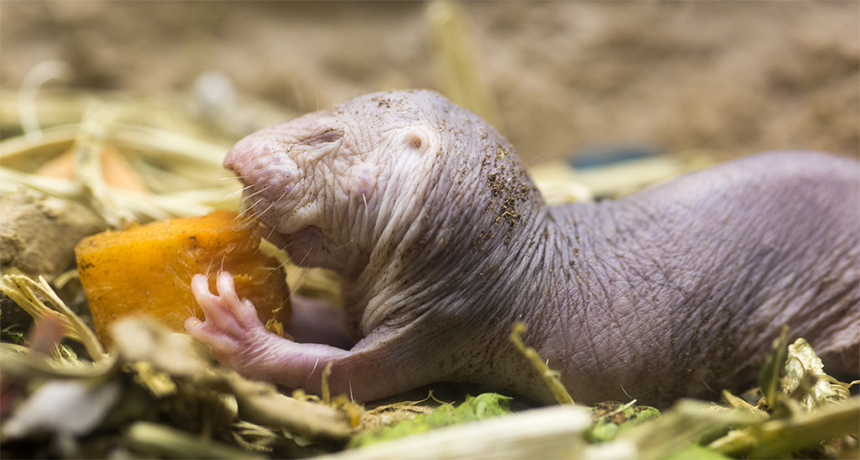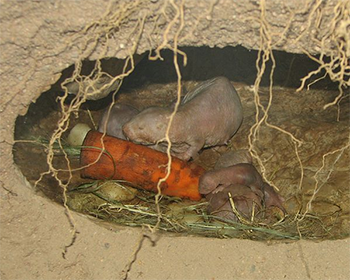biology The study of living things. The scientists who study them are known as biologists.
brood A group of related animals that emerges in a specific region in the same year. Depending on the animal type, the collective group is sometimes also known as a year class. (verb) The act of guarding and/or incubating eggs.
develop To emerge or come into being, either naturally or through human intervention, such as by manufacturing. (in biology) To grow as an organism from conception through adulthood, often undergoing changes in chemistry, size and sometimes even shape.
developmental (in biology) An adjective that refers to the changes an organism undergoes from conception through adulthood. Those changes often involve chemistry, size and sometimes even shape.
diet The foods and liquids ingested by an animal to provide the nutrition it needs to grow and maintain health. (verb) To adopt a specific food-intake plan for the purpose of controlling body weight.
dung The feces of animals, also known as manure.
estradiol The primary female sex hormone, a type of estrogen. Produced throughout life in both males and females. Among adult women, it’s produced mostly by the ovaries, to help the body prepare for the potential to reproduce (have a baby).
extract (v.) To separate one chemical (or component of something) from a complex mix. (noun) A substance, often in concentrated form, that has been removed from its natural source. Extracts are often taken from plants (such as spearmint or lavender), flowers and buds (such as roses and cloves), fruit (such as lemons and oranges) or seeds and nuts (such as almonds and pistachios).
feces A body's solid waste, made up of undigested food, bacteria and water. The feces of larger animals are sometimes also called dung.
groom (in zoology) The practice of some animals to clean another, usually in places the groomed animal can’t see or reach, such as the back, head or face. Sometimes a groomer will remove ticks or other parasites. Other times it might remove tangles in fur or debris such as leaves. The attention the groomed animal receives can be calming and is usually accepted only from a family member or close member of its social group.
hormone (in zoology and medicine) A chemical produced in a gland and then carried in the bloodstream to another part of the body. Hormones control many important body activities, such as growth. Hormones act by triggering or regulating chemical reactions in the body.
native Associated with a particular location; native plants and animals have been found in a particular location since recorded history began. These species also tend to have developed within a region, occurring there naturally (not because they were planted or moved there by people). Most are particularly well adapted to their environment.
nutrient A vitamin, mineral, fat, carbohydrate or protein that a plant, animal or other organism requires as part of its food in order to survive.
organ (in biology) Various parts of an organism that perform one or more particular functions. For instance, an ovary is an organ that makes eggs, the brain is an organ that makes sense of nerve signals and a plant’s roots are organs that take in nutrients and moisture.
ovary (in animals) A female reproductive organ that produces eggs and that secretes some of the hormones needed to regulate the development of secondary sex-related traits (such as breast development in human females). Most female mammals have a pair of ovaries.
Proceedings of the National Academy of Sciences A prestigious journal publishing original scientific research, begun in 1914. The journal's content spans the biological, physical, and social sciences. Each of the more than 3,000 papers it publishes each year, now, are not only peer reviewed but also approved by a member of the U.S. National Academy of Sciences.
pup A term given to the young of many animals, from dogs and mice to seals.
rodent A mammal of the order Rodentia, a group that includes mice, rats, squirrels, guinea pigs, hamsters and porcupines.
scat The feces shed by a wild animal, usually a mammal.
sex An animal’s biological status, typically male or female. There are a number of indicators of biological sex, including sex chromosomes, gonads, internal reproductive organs, and external genitals. It can also be a term for some system of mating between male and female animals such that each parent organism contributes genes to the potential offspring, usually through the fertilization of an egg cell by a sperm cell.
species A group of similar organisms capable of producing offspring that can survive and reproduce.
waste Any materials that are left over from biological or other systems that have no value, so they can be disposed of as trash or recycled for some new use.









